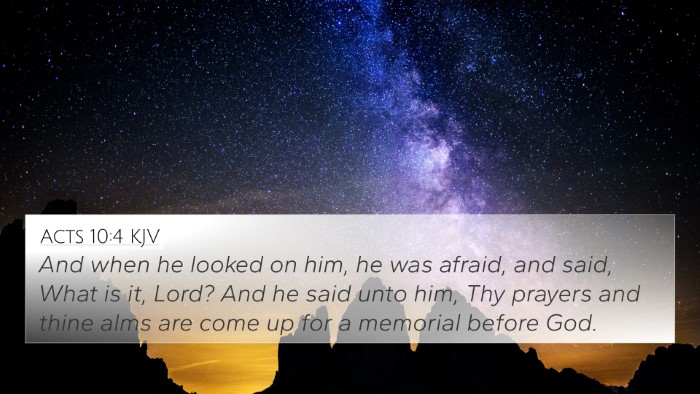Understanding Acts 10:31
Acts 10:31 states: "And said, Cornelius, thy prayer is heard, and thine alms are had in remembrance in the sight of God." This verse highlights the divine acknowledgment of Cornelius's prayers and charitable acts.
Summary of Insights
This verse is pivotal for understanding God’s responsiveness to prayers and good deeds, especially from those outside the traditional Jewish context. Commissioned by God, the apostle Peter is sent to a Gentile, affirming that the grace of God reaches all humanity. This intersection of faith and action encapsulates broader theological themes regarding God's impartiality and the inclusiveness of the Gospel.
Commentary Insights
Matthew Henry's Commentary
Matthew Henry explains that God's awareness of individual supplication and acts of charity serves as a reminder of His omniscience. Henry emphasizes that Cornelius, though a Gentile, exemplifies sincere faith and devotion, marking the expansion of God’s covenant beyond Israel.
Albert Barnes' Notes on the Bible
Barnes elaborates on the significance of God remembering Cornelius’s actions. He posits that this divine remembrance illustrates God’s recognition of spiritual reverence irrespective of conventional boundaries. This act is crucial for laying the groundwork for the Gentile mission.
Adam Clarke's Commentary
Clarke notes the angel's message serves as both affirmation and an invitation to Cornelius, showcasing the essential link between prayer and charitable living. He highlights God’s initiative in salvation, underscoring the importance of faith-driven obedience in the believer's life.
Thematic Connections
Acts 10:31 also leads to various themes within the Bible, including:
- The Power of Prayer: The acknowledgment of Cornelius’s prayers exemplifies the biblical principle that God listens to the prayers of His people.
- The Role of Almsgiving: Showing that acts of kindness resonate with God, which is explored further in Matthew 6:1-4.
- The Gentile Mission: This inaugural experience highlights the major theme of God's plan for all nations, correlating with Isaiah 56:6-7.
- God’s Impartiality: This theme aligns with Romans 2:6-11, emphasizing that God judges no one based on nationality but rather faith and actions.
- Divine Guidance: The communication from God to Cornelius sets a precedent for how believers are guided in their faith, similar to Proverbs 3:5-6.
- Response to Divine Call: God calls individuals to His purpose as seen here, analogous to 1 Samuel 3:10.
- Transformation and Obedience: The call to Cornelius symbolizes personal transformation when responding to divine initiative, relating closely to 2 Corinthians 5:17.
Bible Verse Cross-References
Several verses touch upon the themes expressed in Acts 10:31, including:
- Luke 18:1-8 - Illustrates the importance of consistent prayer.
- Matthew 5:16 - Encourages good works as a testimony to God’s glory.
- John 14:13-14 - Assures believers that their petitions in Jesus' name will be heard.
- Philippians 4:19 - Promises that God will supply all needs, related to faith and trust.
- 1 Peter 3:12 - Reiterates that the eyes of the Lord are upon those who do good.
- Acts 10:4 - Earlier in the chapter, emphasizes that Cornelius’s actions are noticed by God.
- James 1:27 - Defines true religion as caring for orphans and widows, akin to Cornelius's alms.
Understanding the Broader Context
The broader context of Acts 10 involves Peter's vision and God preparing him to preach to the Gentiles, making this passage critical in understanding the beginnings of the early church's mission beyond Jews.
This mission reflects several pivotal scriptural dialogues that show the unfolding of God's redemptive plan through both the Jews and Gentiles.
Conclusion
Acts 10:31 provides deep insights into the character of God regarding prayer and charitable deeds. By examining this verse alongside others, we establish substantial inter-Biblical dialogues that enhance our understanding of the encompassing nature of God's love and the importance of faith expressed through actions.
Exploring Further
For a fuller comprehension, believers can utilize cross-reference tools such as allegorical study methods, concordances, and analytical guides to better understand the links between these scripts and their meanings.
By incorporating these study methods, one can unravel the intricate tapestry of the Bible where verses interconnect, revealing broader themes enriched by contextual explorations and theological interpretations.














